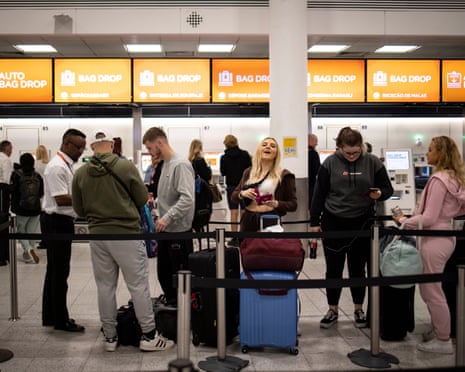Business
UK Airports Brace for Summer Surge as New Travel Rules Take Effect

This weekend marks the beginning of the summer travel season in the UK, with airports anticipating their busiest days of 2025. More than 9,000 flights are scheduled to transport up to 1.7 million passengers abroad. As travel resumes, airlines and airports have made efforts to enhance the travel experience, although changes to luggage allowances, security measures, and border procedures could impact holidaymakers.
One of the most significant changes involves the longstanding 100ml limit on liquids in hand luggage, a regulation that has been in place since 2006. Despite some airports, like Edinburgh and Birmingham, allowing containers of up to two litres through security, the majority of UK airports maintain the 100ml restriction. Transport Secretary Heidi Alexander advised travelers to adhere to this guideline, stating, “You should work on the basis that it is 100ml at the moment unless you have heard from your airport otherwise.”
Security Updates and Cabin Bag Regulations
While upgraded CT scanners at many airports allow passengers to keep laptops and other electronics in their bags, the 100ml liquid limit remains enforced. For instance, at London Gatwick, all security lanes are equipped with CT scanners, yet passengers must still comply with the liquid restrictions.
Carry-on bag dimensions have also become a point of contention as airlines implement varied rules. The regulations for “large” cabin bags, typically charging for wheelie suitcases, remain unchanged. However, a new EU minimum size for small cabin bags has been established at 40cm by 30cm by 15cm, allowing frequent travelers to select a universally accepted bag. Airlines like easyJet already accommodate more generous dimensions, while Ryanair plans to adjust its limits from 40 x 25 x 20cm to 40 x 30 x 20cm in the coming weeks.
Travelers should be cautious, as exceeding these dimensions can lead to hefty fees, such as £60 for Ryanair. The airline association Airlines for Europe has indicated that its members will comply with these new regulations by the end of the 2025 summer season, but larger personal items may still be permitted at individual airline discretion.
Border Regulations and Potential Delays
As UK travelers head to Europe, they may encounter slower processing times at border controls. Since May, an agreement has facilitated the use of e-gates for UK passengers in some EU countries. However, many travelers will continue to go through staffed border posts until the European Union’s new entry-exit system, EES, is implemented in October 2025. This system will require biometric data from travelers on their first visit, utilizing facial recognition technology for border crossings.
Starting in mid-2026, UK visitors will also need a European Travel Information and Authorisation System visa waiver to enter the EU, which will cost €7 (approximately £6). This is a more favorable fee than the £16 charged to enter the UK via its electronic travel authorization.
The travel industry’s recovery from the post-Covid boom has prompted a focus on improved staffing and operational resilience. Airlines are increasingly incorporating AI technology to better manage disruptions and predict potential issues. Despite these advancements, air traffic control remains a challenge, with record flight numbers anticipated and growing congestion in European airspace.
Airlines such as easyJet, Ryanair, and British Airways cite air traffic control delays as their primary concern. In response, British Airways has introduced a new system to automatically provide refreshments to passengers delayed at Heathrow. EasyJet has also enhanced customer support by adding airport customer experience specialists, branded as “Aces,” at prominent hubs.
As travel ramps up this summer, passengers are urged to remain informed about the evolving regulations and prepare for potential delays at security and border control points. With careful planning and adherence to guidelines, travelers can navigate the busy season with greater ease.
-

 World2 weeks ago
World2 weeks agoCoronation Street’s Shocking Murder Twist Reveals Family Secrets
-

 Entertainment1 week ago
Entertainment1 week agoAndrew Pierce Confirms Departure from ITV’s Good Morning Britain
-

 Entertainment5 months ago
Entertainment5 months agoKate Garraway Sells £2 Million Home Amid Financial Struggles
-

 Entertainment4 months ago
Entertainment4 months agoAnn Ming Reflects on ITV’s ‘I Fought the Law’ Drama
-

 Entertainment1 month ago
Entertainment1 month agoCoronation Street Fans React as Todd Faces Heartbreaking Choice
-

 Health4 months ago
Health4 months agoKatie Price Faces New Health Concerns After Cancer Symptoms Resurface
-

 World1 month ago
World1 month agoBailey Announces Heartbreaking Split from Rebecca After Reunion
-

 Entertainment2 weeks ago
Entertainment2 weeks agoTwo Stars Evicted from I’m A Celebrity Just Days Before Finale
-

 World2 weeks ago
World2 weeks agoKevin Sinfield Exceeds Fundraising Goal Ahead of Final Marathons
-

 Entertainment4 months ago
Entertainment4 months agoCoronation Street’s Carl Webster Faces Trouble with New Affairs
-

 Entertainment3 months ago
Entertainment3 months agoWhere is Tinder Swindler Simon Leviev? Latest Updates Revealed
-

 Entertainment5 months ago
Entertainment5 months agoMarkiplier Addresses AI Controversy During Livestream Response





















